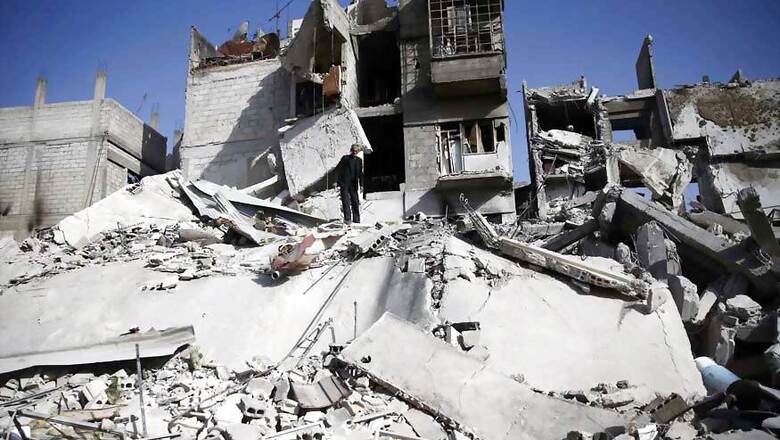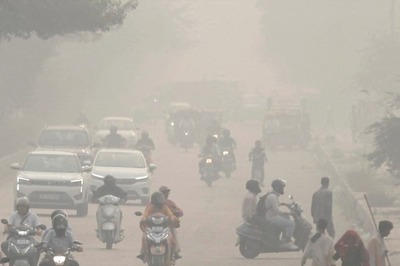
views
Beirut: Syrian government forces pounded eastern Ghouta with air strikes on Wednesday in an effort to slice the rebel enclave in two as they intensified a campaign to deal the opposition its biggest defeat since 2016.
The Syrian government assault of the densely populated area on the outskirts of Damascus, which began more than two weeks ago, has become one of the fiercest campaigns of the war now entering its eighth year, with bombardment killing hundreds.
Live footage broadcast by Syrian state TV from the outskirts of the town of Mesraba showed enormous clouds of smoke rising into the sky. The sounds of explosions and jets could be heard.
A state TV correspondent said militant defences in the town were being struck by "preparatory fire" in advance of a planned infantry assault. "Mesraba is under heavy attack today," said Khalil Aybour, a member of an opposition council in Ghouta.
Capturing Mesraba would be a major step towards severing the northern half of the Ghouta, including its biggest town, Douma, from the southern part. Government forces have seized more than 40 percent of the territory so far. Civilians have been fleeing frontline areas into Douma and hiding in cellars.
"It's bad in the basement, but it's better than the bombing," Adnan, 30, a Douma resident who has been sheltering below ground with his wife and two-year-old daughter together with 10 other families, told Reuters by telephone.
The United Nations says 400,000 people are trapped in the towns and villages of the eastern Ghouta, under government siege for years and already running out of food and medicine before the assault. An aid convoy reached the area this week but government officials had stripped out most medical supplies.
Russia, President Bashar al-Assad's most powerful ally, has offered rebel fighters safe passage out with their families and personal weapons. The proposal echoes previous agreements under which insurgents, in the face of military defeat, were permitted to withdraw to opposition-held areas at the Turkish border.
The Syrian Observatory for Human Rights monitoring group says 800 civilians have been killed by government bombing and shelling. The Observatory said an extra 700 pro-government militia fighters had arrived at the front as reinforcements to join the operation.
The UN Security Council has called for a 30-day countrywide ceasefire, but Moscow and Damascus have not halted the campaign, arguing that the fighters they are striking are members of banned terrorist groups unprotected by the truce.
Russia's defence ministry said on Wednesday some rebels wanted to accept the proposal to evacuate. So far rebels have dismissed it in public. The military spokesman for one of the main eastern Ghouta rebel groups said rebels would defend the territory and there were no negotiations over a withdrawal.
"The factions of Ghouta and their fighters and its people are holding onto their land and will defend it," Hamza Birqdar of Jaish al-Islam told Reuters in a text message sent overnight. The opposition says such evacuation agreements amount to a policy of demographic change by which Assad has forcibly displaced those who oppose him.
In an interview on state TV, a Syrian army colonel expressed confidence Ghouta would fall quickly, saying the people there would return to the "state's embrace" "very, very, very soon". A commander in the military alliance fighting in support of Assad said he anticipated that rebels would end up besieged in Douma and then accept a withdrawal deal.
Assad said this week that the majority of people in eastern Ghouta want a return of state rule. But rebels and opposition activists say people fear government persecution.
COMPLICITY
Russian warplanes have taken part in the eastern Ghouta operation, and the White House has accused Russia of complicity in the killing of civilians there. Defeat in eastern Ghouta would mark the biggest setback for the anti-Assad rebellion since the opposition was driven from eastern Aleppo in late 2016 after a similar campaign of siege, bombing, ground assaults and the promise of safe passage out.
Moscow and Damascus say the Ghouta campaign is necessary to halt rebel shelling of the capital. The Observatory says such shelling has killed at least 27 people since Feb. 18, and Syrian state media have given a higher death toll.
Assad has steadily recovered rebel-held areas in western Syria since Russia intervened directly on his side in 2015. United Nations Secretary-General Antonio Guterres on Tuesday voiced concern about attacks in eastern Ghouta which "reportedly claimed the lives of more than 100 people" on Monday alone, as well as reports of shelling of Damascus.
Western states have been demanding Russia press Assad to abide by the 30-day ceasefire. The Security Council, where Russia holds a veto, will meet on Wednesday to discuss the failed ceasefire.
The UN human rights chief Zeid Ra'ad al-Hussein said the government offensive could not be justified by its targetting of a few hundred fighters. "Recent attempts to justify indiscriminate, brutal attacks on hundreds of thousands of civilians by the need to combat a few hundred fighters – as in Eastern Ghouta – are legally, and morally, unsustainable," he told the UN Human Rights Council.
"Also, when you are prepared to kill your own people so easily, lying is easy too. Claims by the Government of Syria that it is taking every measure to protect its civilian population are frankly ridiculous."

















Comments
0 comment